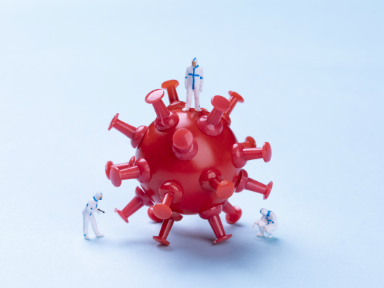europeanpharmaceuticalreviewAugust 03, 2021
Tag: FDA , REGEN-COV™ , COVID-19 , casirivimab , imdevimab
The US Food and Drug Administration (FDA) have revised the emergency use authorisation (EUA) for REGEN-COVTM (casirivimab and imdevimab, administered together), authorising REGEN-COV for emergency use as post-exposure prophylaxis (prevention) for COVID-19 in adults and paediatric individuals who are at high risk for progression to severe COVID-19. REGEN-COV is not authorised for pre-exposure prophylaxis to prevent COVID-19 before being exposed to the SARS-CoV-2 virus which causes the disease.
REGEN-COV also remained authorised for the treatment of mild to moderate COVID-19 in adults and paediatric patients with positive results of direct SARS-CoV-2 viral testing. The FDA also warned that prophylaxis with REGEN-COV is not a substitute for vaccination against COVID-19.
According to the FDA, REGEN-COV should be used as post-exposure prophylaxis for individuals who are:
not fully vaccinated or who are not expected to mount an adequate immune response to complete SARS-CoV-2 vaccination, and
have been exposed to individual infected with SARS-CoV-2 consistent with close contact criteria per Centers for Disease Control and Prevention (CDC), or
who are at high risk of exposure to an individual infected with SARS-CoV-2 because of occurrence of SARS-CoV-2 infection in other individuals in the same institutional setting, such as nursing homes or prisons.

The primary data supporting the EUA reissuance for post-exposure prophylaxis of COVID-19 are from a Phase III trial. The trial was a randomised, double-blind, placebo-controlled clinical study evaluating a single dose of REGEN-COV for prevention of COVID-19 in household contacts of individuals infected with SARS-CoV-2. Cases were confirmed using real-time reverse transcription-polymerase chain reaction (RT-PCR).
An 81 percent reduction in confirmed symptomatic COVID-19 was observed with REGEN-COV compared to placebo at day 29 in those who were RT-PCR negative and seronegative a baseline. In the overall trial population, there was a 62 percent reduction in RT-PCR confirmed symptomatic COVID-19 cases in the REGEN-COV group compared to placebo at day 29.
The most common side effects were injection site reactions. The signs and symptoms of injection site reactions which occurred in at least one percent of subjects in the REGEN-COV group were skin redness (erythema), an uncomfortable, irritating sensation that creates an urge to scratch (pruritus), and ecchymosis (discoloration of the skin resulting from bleeding underneath, caused by bruising). There were no cases of severe hypersensitivity reactions or potentially life-threatening allergic reactions (such as anaphylaxis).
The authorised dose for REGEN-COV for both treatment and as post-exposure prophylaxis is 600mg of casirivimab and 600mg of imdevimab administered together. For treatment, intravenous infusion is strongly recommended by the FDA. Subcutaneous injection is authorised as an alternative route of administration when intravenous infusion is not feasible and would lead to delay in treatment.
For post-exposure prophylaxis, either intravenous infusion or subcutaneous injection is appropriate. For individuals who remain at high risk of exposure to another individual with SARS-CoV-2 for longer than four weeks and who are not expected to mount an adequate immune response to full SARS-CoV-2 vaccination, following an initial dose of 600mg of casirivimab and 600mg of imdevimab, repeat doses of 300mg of casirivimab and 300mg of imdevimab once every four weeks are appropriate for the duration of ongoing exposure.


Contact Us
Tel: (+86) 400 610 1188
WhatsApp/Telegram/Wechat: +86 13621645194
Follow Us:




 Pharma Sources Insight January 2025
Pharma Sources Insight January 2025


